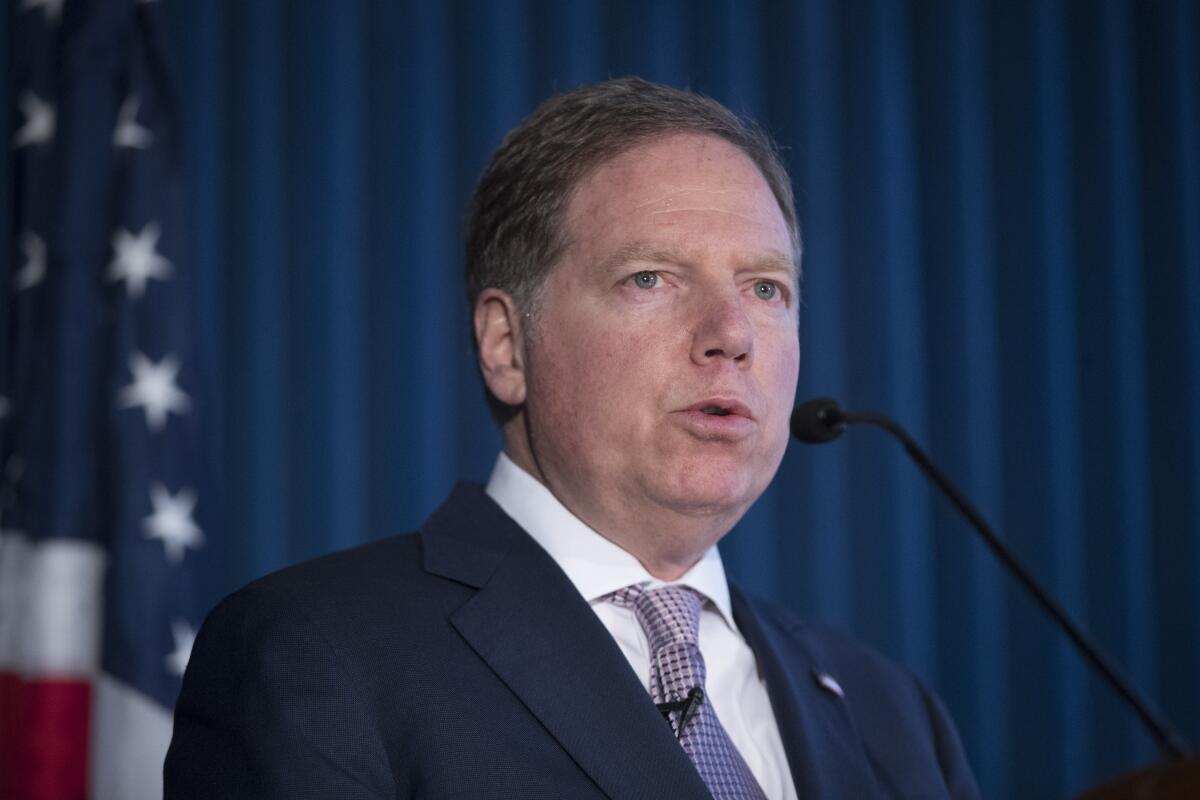Op-Ed: Barrâs goal of dumping the Manhattan U.S. attorney has gotten a lot more complicated

The announcement late Friday from Atty. Gen. William Barr seemed unequivocal. The U.S. attorney in Manhattan, Geoffrey Berman, would resign. The prosecutor had long been in the administrationâs sights, having directed investigations into President Trumpâs inner circle and guided the successful prosecution of Trumpâs personal attorney Michael Cohen.
But soon after the resignation was announced, Berman issued a statement of his own. âI have not resigned, and have no intention of resigning, my position,â Berman said.
Today, Barr announced that Trump, at the attorney generalâs request, had fired Berman, and that Bermanâs top deputy, Audrey Strauss, will be the interim head of the Southern District of New York until a permanent successor is in place. Berman then agreed to step aside, citing Barrâs âdecision to respect the normal operation of the lawâ by replacing him with Strauss, a respected career prosecutor.
Bermanâs agreement to leave without a fight might appear to be the end of the short, high-stakes battle between a powerful prosecutor and his even more powerful boss, but it isnât. Bermanâs departure does not fully accomplish what Barr and Trump wanted: asserting control over ongoing investigations by the Manhattan U.S. attorney. To fully accomplish that, they will need a pliable U.S. attorney in Bermanâs stead. Strauss is unlikely to fill that role.
The goal of reining in the Manhattan office couldnât be accomplished simply by ousting Berman because of the unique way in which he was appointed. After his nomination, he was not confirmed by the Senate, but rather appointed by the judges of the district where he served. That placed him in a slightly different legal position, and he might have been able to successfully argue in court that the U.S. Code allowed him to stay until a successor was confirmed for the job.
Because Strauss was not appointed in the same way, she is covered by a different code section. That strengthens Barrâs legal position should he decide to oust Strauss and install the person he has said he wants in the job, Jay Clayton, who serves as chairman of the Securities and Exchange Commission.
But whatever enhanced legal authority Barr may have with Berman out, his practical options may have narrowed. Thatâs because any move to oust Strauss now will be seen as a blatant effort to shut down investigations involving Trump.
Barr and Trump have shown themselves more than willing to ignore disapproval of their actions, but the president is facing what could be a tough reelection campaign, and he risks damaging himself politically.
And as a practical matter, the administration could run into serious headwinds trying to get a successor to Berman confirmed. Sen. Lindsey Graham (R-S.C.), the chairman of the Senate Judiciary Committee, has said he will respect the normal process for such confirmations, which allows senators from the state in which an appointment is made to bottle up a U.S. attorney nomination. Itâs a safe bet that New York Sens. Charles E. Schumer and Kirsten Gillibrand, both Democrats, will not permit a nomination to proceed.
Barr and Trump thus have a choice between two unattractive options. They can leave Strauss in office and permit ongoing investigations to proceed unimpeded, or they can move to oust her and prompt a certain firestorm.
If they take the latter course, Strauss would have the strategic option of trying to resist through legal action, a route Berman would likely have taken had Strauss not been appointed. A court would undoubtedly understand the broader stakes at issue in any such dispute.
The most important factor Strauss would have on her side if she took that route would be time. It would be a gorgeous reversal of the dynamic that Trump has so frequently exploited by running to court with lousy arguments that nevertheless buy him the time he needs on the political front.
As long as Strauss remains in charge, the investigations are likely to be vigorously pursued. And each day the office continues its digging, the president will be tying himself in angry knots.
@harrylitman
More to Read
A cure for the common opinion
Get thought-provoking perspectives with our weekly newsletter.
You may occasionally receive promotional content from the Los Angeles Times.










